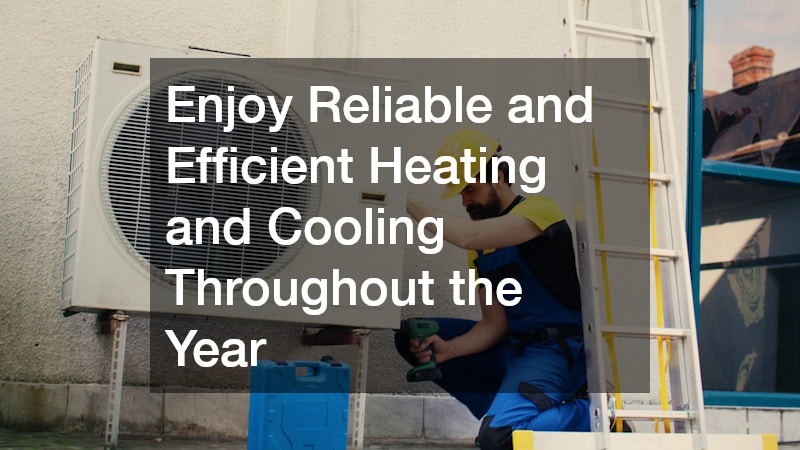
Maintaining your heat pump is essential to ensure it operates efficiently and reliably throughout the year. A heat pump that is well-maintained can save energy, reduce costs, and extend the lifespan of the system. Yet, homeowners often encounter common repair needs, which, if not addressed in a timely manner, can lead to more significant issues and even system failure.
1. Why is My Heat Pump Not Heating Efficiently?
A. Common Causes of Inefficient Heating
One of the most frequent reasons for a heat pump’s inefficient heating is blocked filters. These filters, when clogged, restrict airflow, which leads to insufficient heating throughout the home.
Additionally, incorrect thermostat settings and low refrigerant levels can greatly impact the pump’s efficiency, resulting in higher energy consumption and reduced comfort levels.
Blocked filters are often overlooked, but they play a significant role in the system’s overall performance. Regular inspection and replacement of filters can help maintain optimal airflow and heating efficiency. Understanding the thermostat’s programming and ensuring it is set correctly can prevent unnecessary wear on the system.
Refrigerant levels might deplete over time due to leaks or other issues, affecting the heating capacity. Routine checks and professional servicing are crucial to detect and address refrigerant problems. Engaging with a certified technician will ensure the entire refrigerant system is functioning as intended, thereby maintaining the heat pump’s efficiency.
B. Diagnosing Heating Issues
The process of diagnosing heating issues begins with checking the thermostat for accurate settings and readings. A thermostat that doesn’t communicate effectively with the heat pump may cause uneven heating or cooling. Verifying that it is functioning correctly is a simple yet essential first step in troubleshooting.
Next, inspecting the filters is crucial, as clogged filters are a common source of reduced heating efficiency. It is advisable to replace or clean filters regularly to ensure they do not obstruct airflow. By keeping these components in good condition, you can prevent the heat pump from overworking and consuming more energy than necessary.
Finally, evaluating the overall airflow of the system can uncover additional issues. If there is an unexpected drop in airflow, the culprit could be debris, a malfunctioning fan, or ductwork issues. Addressing these concerns promptly can restore the system’s performance and prevent escalation of the problem.
2. Why is My Heat Pump Making Strange Noises?
A. Identifying Unusual Sounds
Strange noises emanating from a heat pump usually indicate underlying issues that require attention. Common noises include rattling, buzzing, and banging, each pointing to different potential problems within the system. Identifying these sounds can provide crucial insights into what might be malfunctioning.
Rattling sounds often suggest that there are loose parts within the heat pump, which could potentially lead to further damage if left unchecked. Buzzing may point to electrical issues or debris in the unit, while banging typically indicates more serious mechanical problems. Correctly identifying the type of noise can help in diagnosing the issue more accurately.
Understanding the source of these noises is vital for determining the appropriate course of action. Regularly listening for unusual sounds and taking notes can assist technicians in identifying and fixing the issue promptly. This proactive approach can prevent small issues from developing into costly repairs.
B. Potential Sources of Noises
Among the most common sources of abnormal noises are loose parts, which can occur from normal wear and tear over time. These parts, if not secured promptly, can not only create irritating sounds but also cause further internal damage. Checking and tightening any found loose components is a simple but effective way to deal with minor issues.
Debris in the outdoor unit can also contribute significantly to noise problems. Leaves, twigs, and other materials might get caught in the fan or other components, causing them to operate inefficiently. Clearing the unit of any foreign materials will often alleviate this issue without the need for extensive repairs.
Motor issues tend to generate more persistent sounds such as humming or grinding. These are indicative of more severe problems where professional intervention is often required. Maintaining the motor and ensuring proper lubrication and calibration can prevent these noises and the associated repair needs.
3. Why is My Heat Pump Freezing Up?
A. Factors Leading to Freeze Ups
Heat pumps freezing up is a common problem during both summer and winter seasons. Restricted airflow, refrigerant issues, and faulty defrost controls are principal factors that contribute to this problem. Understanding these issues can help homeowners prevent their heat pumps from malfunctioning.
Restricted airflow is often due to blocked filters or obstructions around the outdoor unit, which should be cleared to ensure proper operation. When airflow is hindered, the coils are unable to transfer heat efficiently, leading to ice formation. This not only reduces efficiency but can also damage the system if not addressed.
Refrigerant issues, such as leaks or insufficient levels, can also cause the evaporator coil to freeze. Scheduling routine checks ensures that these problems are identified and fixed promptly. Proper functioning of the defrost cycle is also crucial for preventing freeze-ups, as it melts any ice accumulation on the outdoor unit.
B. Detecting Potential Freeze Triggers
Identifying freeze triggers involves checking for airflow obstructions regularly. This might include inspecting the outdoor unit for debris and monitoring indoor vents for consistent airflow. Doing so ensures that the heat pump is not working harder than it should.
In addition to airflow, testing the defrost cycle plays a significant role in preventing freeze-ups. A malfunctioning defrost control can lead to ice buildup, preventing the pump from operating effectively. Regular testing and timely repair of the defrost system can prevent such failures.
Identifying and addressing common heat pump repair issues is imperative to maintaining optimal performance and efficiency. From heating inefficiencies and unusual noises to freeze-ups, each problem benefits from early detection and resolution. With consistent upkeep and timely professional intervention, homeowners can enjoy reliable and efficient heating and cooling throughout the year.




